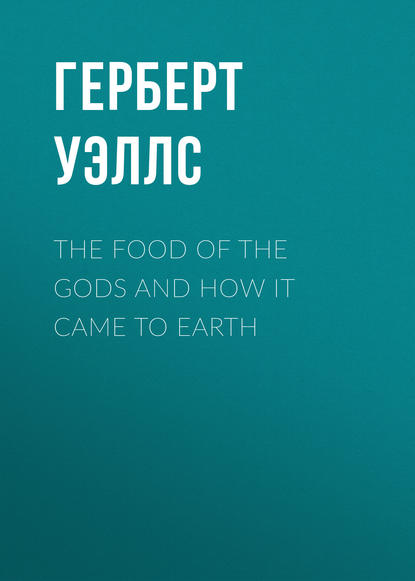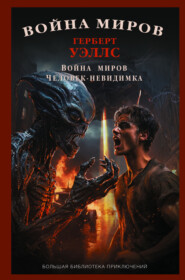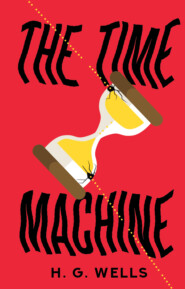По всем вопросам обращайтесь на: info@litportal.ru
(©) 2003-2025.
✖
The Food of the Gods and How It Came to Earth
Настройки чтения
Размер шрифта
Высота строк
Поля
"As he will," said the eldest, staring at his feet.
The middle brother ceased his lopping, and his eye went to the great banks that sheltered them about. "Then, brothers," he said, "our youth will be over, and, as Father Redwood said to us long ago, we must quit ourselves like men."
"Yes," said the eldest brother; "but what exactly does that mean? Just what does it mean – when that day of trouble comes?"
He too glanced at those rude vast suggestions of entrenchment about them, looking not so much at them as through them and over the hills to the innumerable multitudes beyond. Something of the same sort came into all their minds – a vision of little people coming out to war, in a flood, the little people, inexhaustible, incessant, malignant…
"They are little," said the youngest brother; "but they have numbers beyond counting, like the sands of the sea."
"They have arms – they have weapons even, that our brothers in Sunderland have made."
"Besides, Brothers, except for vermin, except for little accidents with evil things, what have we seen of killing?"
"I know," said the eldest brother. "For all that – we are what we are.
When the day of trouble comes we must do the thing we have to do."
He closed his knife with a snap – the blade was the length of a man – and used his new pine staff to help himself rise. He stood up and turned towards the squat grey immensity of the house. The crimson of the sunset caught him as he rose, caught the mail and clasps about his neck and the woven metal of his arms, and to the eyes of his brother it seemed as though he was suddenly suffused with blood …
As the young giant rose a little black figure became visible to him against that western incandescence on the top of the embankment that towered above the summit of the down. The black limbs waved in ungainly gestures. Something in the fling of the limbs suggested haste to the young giant's mind. He waved his pine mast in reply, filled the whole valley with his vast Hullo! threw a "Something's up" to his brothers, and set off in twenty-foot strides to meet and help his father.
V
It chanced too that a young man who was not a giant was delivering his soul about these sons of Cossar just at that same time. He had come over the hills beyond Sevenoaks, he and his friend, and he it was did the talking. In the hedge as they came along they had heard a pitiful squealing, and had intervened to rescue three nestling tits from the attack of a couple of giant ants. That adventure it was had set him talking.
"Reactionary!" he was saying, as they came within sight of the Cossar encampment. "Who wouldn't be reactionary? Look at that square of ground, that space of God's earth that was once sweet and fair, torn, desecrated, disembowelled! Those sheds! That great wind-wheel! That monstrous wheeled machine! Those dykes! Look at those three monsters squatting there, plotting some ugly devilment or other! Look – look at all the land!"
His friend glanced at his face. "You have been listening to Caterham," he said.
"Using my eyes. Looking a little into the peace and order of the past we leave behind. This foul Food is the last shape of the Devil, still set as ever upon the ruin of our world. Think what the world must have been before our days, what it was still when our mothers bore us, and see it now! Think how these slopes once smiled under the golden harvest, how the hedges, full of sweet little flowers, parted the modest portion of this man from that, how the ruddy farmhouses dotted the land, and the voice of the church bells from yonder tower stilled the whole world each Sabbath into Sabbath prayer. And now, every year, still more and more of monstrous weeds, of monstrous vermin, and these giants growing all about us, straddling over us, blundering against all that is subtle and sacred in our world. Why here – Look!"
He pointed, and his friend's eyes followed the line of his white finger.
"One of their footmarks. See! It has smashed itself three feet deep and more, a pitfall for horse and rider, a trap to the unwary. There is a briar rose smashed to death; there is grass uprooted and a teazle crushed aside, a farmer's drain pipe snapped and the edge of the pathway broken down. Destruction! So they are doing all over the world, all over the order and decency the world of men has made. Trampling on all things. Reaction! What else?"
"But – reaction. What do you hope to do?"
"Stop it!" cried the young man from Oxford. "Before it is too late."
"But – "
"It's not impossible," cried the young man from Oxford, with a jump in his voice. "We want the firm hand; we want the subtle plan, the resolute mind. We have been mealy-mouthed and weak-handed; we have trifled and temporised and the Food has grown and grown. Yet even now – "
He stopped for a moment. "This is the echo of Caterham," said his friend.
"Even now. Even now there is hope – abundant hope, if only we make sure of what we want and what we mean to destroy. The mass of people are with us, much more with us than they were a few years ago; the law is with us, the constitution and order of society, the spirit of the established religions, the customs and habits of mankind are with us – and against the Food. Why should we temporise? Why should we lie? We hate it, we don't want it; why then should we have it? Do you mean to just grizzle and obstruct passively and do nothing – till the sands are out?"
He stopped short and turned about. "Look at that grove of nettles there. In the midst of them are homes – deserted – where once clean families of simple men played out their honest lives!
"And there!" he swung round to where the young Cossars muttered to one another of their wrongs.
"Look at them! And I know their father, a brute, a sort of brute beast with an intolerant loud voice, a creature who has ran amuck in our all too merciful world for the last thirty years and more. An engineer! To him all that we hold dear and sacred is nothing. Nothing! The splendid traditions of our race and land, the noble institutions, the venerable order, the broad slow march from precedent to precedent that has made our English people great and this sunny island free – it is all an idle tale, told and done with. Some claptrap about the Future is worth all these sacred things… The sort of man who would run a tramway over his mother's grave if he thought that was the cheapest line the tramway could take… And you think to temporise, to make some scheme of compromise, that will enable you to live in your way while that – that machinery – lives in its. I tell you it is hopeless – hopeless. As well make treaties with a tiger! They want things monstrous – we want them sane and sweet. It is one thing or the other."
"But what can you do?"
"Much! All! Stop the Food! They are still scattered, these giants; still immature and disunited. Chain them, gag them, muzzle them. At any cost stop them. It is their world or ours! Stop the Food. Shut up these men who make it. Do anything to stop Cossar! You don't seem to remember – one generation – only one generation needs holding down, and then – Then we could level those mounds there, fill up their footsteps, take the ugly sirens from our church towers, smash all our elephant guns, and turn our faces again to the old order, the ripe old civilisation for which the soul of man is fitted."
"It's a mighty effort."
"For a mighty end. And if we don't? Don't you see the prospect before us clear as day? Everywhere the giants will increase and multiply; everywhere they will make and scatter the Food. The grass will grow gigantic in our fields, the weeds in our hedges, the vermin in the thickets, the rats in the drains. More and more and more. This is only a beginning. The insect world will rise on us, the plant world, the very fishes in the sea, will swamp and drown our ships. Tremendous growths will obscure and hide our houses, smother our churches, smash and destroy all the order of our cities, and we shall become no more than a feeble vermin under the heels of the new race. Mankind will be swamped and drowned in things of its own begetting! And all for nothing! Size! Mere size! Enlargement and da capo. Already we go picking our way among the first beginnings of the coming time. And all we do is to say 'How inconvenient!' To grumble and do nothing. No!"
He raised his hand.
"Let them do the thing they have to do! So also will I. I am for Reaction – unstinted and fearless Reaction. Unless you mean to take this Food also, what else is there to do in all the world? We have trifled in the middle ways too long. You! Trifling in the middle ways is your habit, your circle of existence, your space and time. So, not I! I am against the Food, with all my strength and purpose against the Food."
He turned on his companion's grunt of dissent. "Where are you?"
"It's a complicated business – "
"Oh! – Driftwood!" said the young man from Oxford, very bitterly, with a fling of all his limbs. "The middle way is nothingness. It is one thing or the other. Eat or destroy. Eat or destroy! What else is there to do?"
CHAPTER THE SECOND.
THE GIANT LOVERS
I
Now it chanced in the days when Caterham was campaigning against the Boom-children before the General Election that was – amidst the most tragic and terrible circumstances – to bring him into power, that the giant Princess, that Serene Highness whose early nutrition had played so great a part in the brilliant career of Doctor Winkles, had come from the kingdom of her father to England, on an occasion that was deemed important. She was affianced for reasons of state to a certain Prince – and the wedding was to be made an event of international significance. There had arisen mysterious delays. Rumour and Imagination collaborated in the story and many things were said. There were suggestions of a recalcitrant Prince who declared he would not be made to look like a fool – at least to this extent. People sympathised with him. That is the most significant aspect of the affair.
Now it may seem a strange thing, but it is a fact that the giant Princess, when she came to England, knew of no other giants whatever. She had lived in a world where tact is almost a passion and reservations the air of one's life. They had kept the thing from her; they had hedged her about from sight or suspicion of any gigantic form, until her appointed coming to England was due. Until she met young Redwood she had no inkling that there was such a thing as another giant in the world.
In the kingdom of the father of the Princess there were wild wastes of upland and mountains where she had been accustomed to roam freely. She loved the sunrise and the sunset and all the great drama of the open heavens more than anything else in the world, but among a people at once so democratic and so vehemently loyal as the English her freedom was much restricted. People came in brakes, in excursion trains, in organised multitudes to see her; they would cycle long distances to stare at her, and it was necessary to rise betimes if she would walk in peace. It was still near the dawn that morning when young Redwood came upon her.
The Great Park near the Palace where she lodged stretched, for a score of miles and more, west and south of the western palace gates. The chestnut trees of its avenues reached high above her head. Each one as she passed it seemed to proffer a more abundant wealth of blossom. For a time she was content with sight and scent, but at last she was won over by these offers, and set herself so busily to choose and pick that she did not perceive young Redwood until he was close upon her.
She moved among the chestnut trees, with the destined lover drawing near to her, unanticipated, unsuspected. She thrust her hands in among the branches, breaking them and gathering them. She was alone in the world. Then —
She looked up, and in that moment she was mated.
We must needs put our imaginations to his stature to see the beauty he saw. That unapproachable greatness that prevents our immediate sympathy with her did not exist for him. There she stood, a gracious girl, the first created being that had ever seemed a mate for him, light and slender, lightly clad, the fresh breeze of the dawn moulding the subtly folding robe upon her against the soft strong lines of her form, and with a great mass of blossoming chestnut branches in her hands. The collar of her robe opened to show the whiteness of her neck and a soft shadowed roundness that passed out of sight towards her shoulders. The breeze had stolen a strand or so of her hair too, and strained its red-tipped brown across her cheek. Her eyes were open blue, and her lips rested always in the promise of a smile as she reached among the branches.
She turned upon him with a start, saw him, and for a space they regarded one another. For her, the sight of him was so amazing, so incredible, as to be, for some moments at least, terrible. He came to her with the shock of a supernatural apparition; he broke all the established law of her world. He was a youth of one-and-twenty then, slenderly built, with his father's darkness and his father's gravity. He was clad in a sober soft brown leather, close-fitting easy garments, and in brown hose, that shaped him bravely. His head went uncovered in all weathers. They stood regarding one another – she incredulously amazed, and he with his heart beating fast. It was a moment without a prelude, the cardinal meeting of their lives.
For him there was less surprise. He had been seeking her, and yet his heart beat fast. He came towards her, slowly, with his eyes upon her face.
"You are the Princess," he said. "My father has told me. You are the Princess who was given the Food of the Gods."
"I am the Princess – yes," she said, with eyes of wonder. "But – what are you?"

















